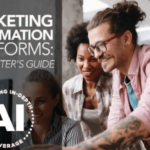On a recent Marketing Against the Grain podcast episode, HubSpot founder and CTO Dharmesh Shah sat down with hosts Kipp Bodnar and Kieran Flanagan to discuss the rise of AI agents.
When I heard the term “AI agents,” I thought of little robots sneaking around like spies, completing tasks for marketers.
Obviously, that‘s not completely true (they don’t wear suits), but they are very helpful to marketers and are predicted to greatly improve their efficiency and productivity.
AI agents are the latest AI trends to crop in sales and marketing, but are they worth it? Let’s get into some of the points covered in the episode:
What is an AI agent?
According to Shah, an AI agent is a piece of software that uses AI to accomplish a multi-step goal.
“There are varying definitions of what an AI agent actually is,” he says. “There is a spectrum of capabilities. You have very simple agents and sophisticated agents that do multi-agent things and reasoning.”
But whether we’re talking about simple AI agents or more complex ones, the standout feature is their ability to carry out multistep goals that require different functions. According to Shah, this capability separates them from AI tools such as ChatGPT.
Think of it like this: When I use an AI tool like ChaGPT, it’s a simple back-and-forth interaction. I make a request, and the chatbot responds.
“Whereas with an agent, you’re giving it a higher order goal, and it may need to invoke Language Modeling (LM) or multiple LMs and use other AI tools and some classic tools to pull together whatever goal you’re trying to accomplish.”
A simple way to think about it is that AI agents are the next generation of automation tools to streamline marketing workflows and tasks.
When to Use AI Agents
So, when should you use an AI agent instead of a standard AI tool like a chatbot? This is actually what I find most interesting about the podcast‘s discussion of AI agents.
When we think of AI, it’s hard to banish the thought (fear) of it replacing humans. However, Shah explains that an AI agent is most helpful when a human is needed to kick off the task, but many steps can be taken without human intervention.
For example, let’s say a small business owner wants to route leads in their CRM using ChatGPT. They could plug customer data into ChatGPT to see what the chatbot generates.
However, if they want to take things a step further, they could use an AI Agent to bring them the most recent company numbers added to the CRM to conduct research.
They could then write rules about how they want the lead writing to happen.
“This is all doable with today’s technology and AI agents,” Shah says.
Essentially, AI agents should be used when “you know what to do manually, and you could do it manually—but you want to automate some of those steps instead of trying to do this kind of one-off shot with ChatGPT,” according to Shah.
AI Agents in Content Marketing
If you‘re a content creator and marketer like him, you’re probably curious about how AI agents can help in the realm of content marketing, such as creating blog content, social media posts, videos, and graphics.
I‘ve said in the past that marketers should think of AI as a digital assistant. If that’s the case (and it is), think of AI agents as your digital team.
“The really exciting thing about these agents is that they can actually use each other,” Shah explains.
Shah mentions generative AI tools as an example and the need for images generated for your business to adhere to a style and color palette specific to your brand.
“So, I built an agent called a Color Palette Extractor,” he says. “It’s a very simple agent. All you do is give it the home page or any web page. It will take a screenshot of that web page, determine which colors are used, and give you a palette proportional to the percentage of real estate that color took.”
In other words, the AI agent will generate a color palette based on the web page you fed it.
You can then take the color palette that the agent produced and pass it to another agent that will incorporate that palette to generate images or other content.
“So that’s the composing two agents that didn’t know anything about each other until you glued them together creatively,” he says.
From there, you can take the image and run it through a LinkedIn post generator, incorporating the results of the previous two agents. That’s three agents working together as a team to generate content for your business.
Concerns with AI Agents
Listening to the podcast, Shah, Bodnar, and Flanagan’s excitement about the possibilities presented by AI agents was impossible to ignore.
Shan event mentions a future where AI agents could be treated almost as salaried employees and a natural part of marketing teams.
“Some day, agents are going to have a salary that is, say, $2.00 a month, or whatever the price tag happens to be,” he says.
While I mentioned earlier that humans are still needed when using AI agents, there are concerns about what a human‘s role could look like if we’re talking about teams of AI agents.
Personally, I think an explanation would be that human marketers will still be integral to the marketing process even with the addition of AI agents, they just need to amp up their skills and consider a supervising role.
Think about it: Even the greatest teams need a leader and supervisor.
Jeremy Kahn, AI editor at Fortune Magazine, seems to share my sentiment in an interview with Fortunate Magazine.
“We need to redefine human roles, focusing on higher-level skills for supervising systems. I anticipate people will oversee multiple AI systems simultaneously, serving as both guides and judges of these systems’ outputs,” Kahn says.
So, are AI agents worth the investment?
I think any technological advances that can streamline processes, free up time for marketers, and keep their businesses competitive are worth the investment. However, with great AI advancements comes great responsibility.
In pretty much every post I’ve ever written about AI (and I‘ve written a lot), I’ve said that AI best practices include overlooking, proofing, and adding a human touch to every AI-generated output. And that doesn’t change with the use of AI agents.
In fact, I think it’s even more important to supervise your team of AI agents and tools because more machines involved means more cooks in the kitchen.
So, yes, look into AI agents and consider ways they can make your life easier as a marketer or business owner. Just make sure you’re supervising your team of agents.
![]()





![Download Now: The Annual State of Artificial Intelligence in 2024 [Free Report]](https://no-cache.hubspot.com/cta/default/53/b72f2b25-8cc9-4642-9a1b-1e675d3d273b.png)



